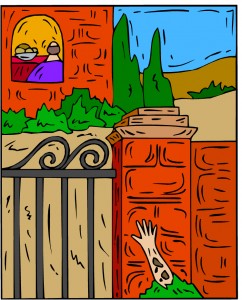Luke 24:30, He sat at the table. (See also vv. 41–43; John 21:12–13). In Bible times, when a covenant of friendship had been broken, as had occurred when the disciples forsook Yeshua prior to his apprehension, the broken relationship would be restored by eating together. After his resurrection, Yeshua had at least three meals with his disciples in order to renew loving covenantal relationship with them (Manners and Customs, pp. 78–79).
In Hebraic thought, one’s table is a sort of sacred altar where familial and spiritual communion occurs. You don’t just break bread with anyone—only your close friends. Additionally, when a prayer of thanksgiving is made over a meal, YHVH’s Presence is invoked making the meal a sort of spiritual act where heaven and earth commune together.
This is one reason why the Passover seder meal is of such serious significance. Only those of one’s spiritual family are to gather together at the seder where together they meet with Elohim. Furthermore, this is why Paul states in 1 Cor 5:9–11,
I wrote to you in my epistle not to keep company with sexually immoral people. Yet I certainly did not mean with the sexually immoral people of this world, or with the covetous, or extortioners, or idolaters, since then you would need to go out of the world. But now I have written to you not to keep company with anyone named a brother, who is sexually immoral, or covetous, or an idolater, or a reviler, or a drunkard, or an extortioner—not even to eat with such a person. (emphasis added)








